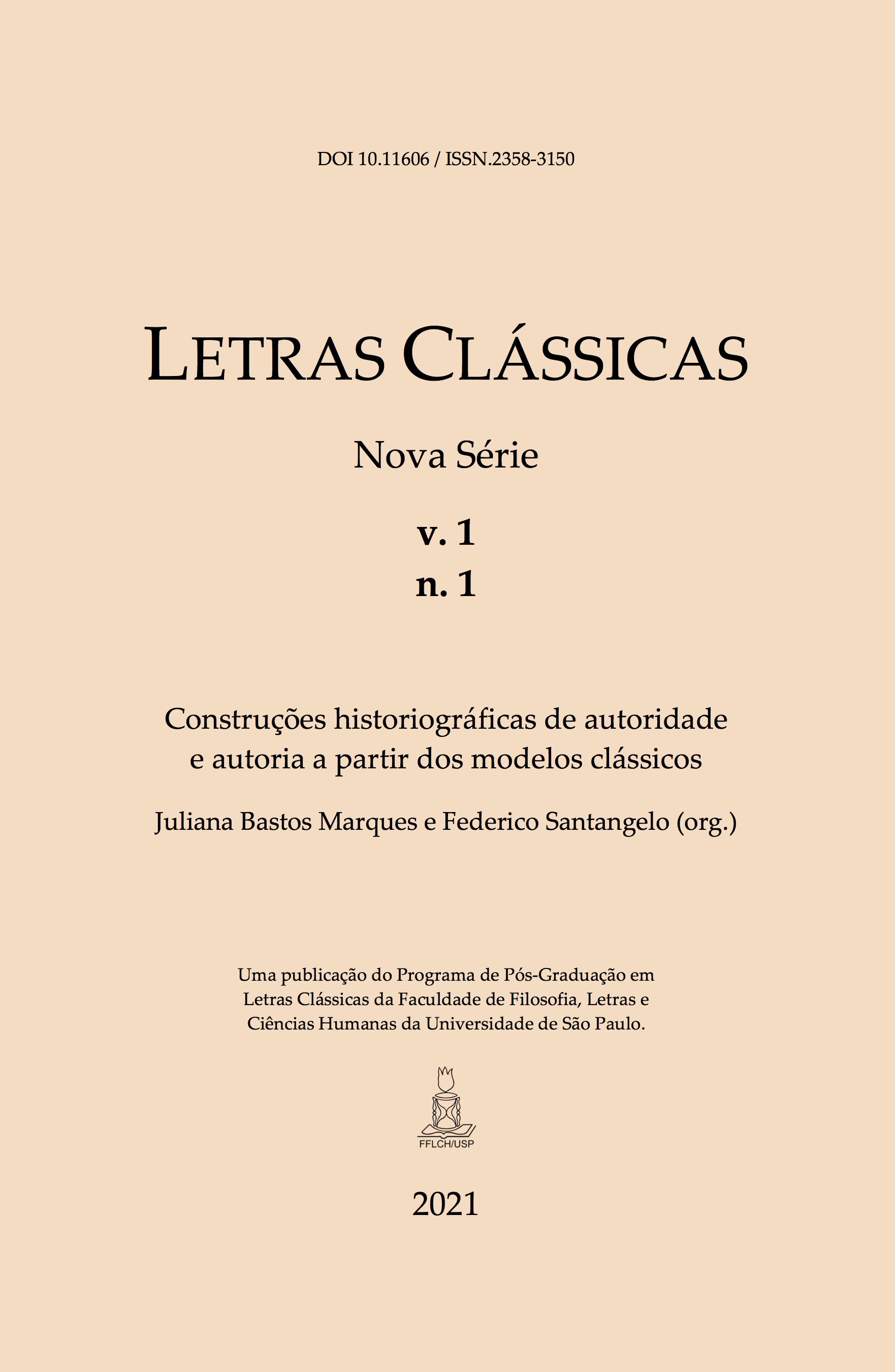The nature and origin of partes prudentiae in cic. Inv. 2.160
DOI:
https://doi.org/10.11606/issn.2358-3150.v1i1p126-139Resumo
The concept of prudentia in Cicero has deservedly received a lot of scholarly attention lately. Fundamental insights have been offered into its different uses in Latin, its relation to Greek φρόνησις, its emphasis on the semantic field of sight and on providentia, its relation to divination, and its philosophical background. One of its most important aspects, though, the understanding, linking and combining of past, present and future events in order to establish causal relationships and thus substantiate one’s decision-making process, needs to be more deeply addressed than has been done so far. I believe that some important aspects of Ciceronian prudentia have until now eluded scholars because of an understandable methodological concern to stick to the occurrences of the word (and its cognate providentia) in Cicero’s corpus. Nevertheless, by following the numerous philosophical treatments of the intellectual ability to correlate past, present and future in Cicero’s work, we will be able to get a clearer picture of Ciceronian prudentia in general and of the enumeration of its partes in De inventione. Also, we will be able to expand on Malaspina’s recent conclusion that the presentation of the parts of prudentia in De inventione is compatible with Chrysippus’ doctrine: it will be shown that Panaetius is the most likely thinker to have adapted Chrysippus’ conceptions in his reworking of Stoic doctrine.
Downloads
Referências
F. Alesse, ed. Panezio di Rodi. Testimonianze. Napoli: Bibliopolis, 1997. E.M. Atkins, ed. Cicero:
On Duties. Cambridge Texts in the History of Political Thought. Cambridge: Cambridge University Press, 1991.
S. Aubert-Baillot. “De la φρóνησις à la prudentia.” In: Mnemosyne 68.1 (2015), pp. 68–90.
S. Aubert-Baillot. “Prudentia, prouidentia : prudence et prévoyance dans les lettres de conseil et de direction chez Cicéron.” In: Conseiller, diriger par lettre. Ed. by É. Gavoille and F. Guillaumont. Presses Universitaires François Rabelais, 2017, pp. 121–136.
R.W. Cape Jr. “Cicero and the Development of Prudential Practice at Rome.” In: Prudence: Classical Virtue, Postmodern Practice. Ed. by R. Hariman. University Park: Pennsylvania State University Press, 2003, pp. 48–65.
L. V. Ciferri. “Le concept de prudentia par rapport à la loi chez Cicéron.” In: Revue Internationale des droits de l’antiquité 40 (1993), pp. 209–226.
A.R. Dyck. A Commentary on Cicero, De Officiis. University of Michigan Press, 1996.
H.M. Hubbell, ed. Cicero. On Invention. Best Kind of Orator. Topics. Cambridge, MA and London, England: Harvard University Press, 2006 [1949].
J.E. King, ed. Cicero. Tusculan Disputations. Cambridge, MA and London, England: Harvard University Press, 1971 [1945].
E. Malaspina. “Memoria, prudentia, oblivio, monumentum. Appunti per una semantica del ricordo in Cicerone.” In: La Mémoire en pièces. Ed. by A. Raffarin and G. Marcellino. Paris: Garnier, 2020, pp. 103–136.
J.P. Martin. Providentia deorum: recherches sur certains aspects religieux du pouvoir impérial romain. Collection de l’École française de Rome. Rome: École française de Rome, 1982.
M.A. Rackham, ed. Cicero. De natura deorum. Academica. Cambridge, MA and London, England: Harvard University Press and William Heinemann Ltd, 1967 [1933].
N. Rudd, ed. Cicero. The Republic and The Laws. Oxford World’s Classics. OUP Oxford, 1998.
F. Santangelo. “Cicero on Divine and Human Foresight.” In: Cicero and Roman Religion: Eight Studies. Ed. by C. Beltrão da Rosa and F. Santangelo. Stuttgart: Franz Steiner, 2020, pp.105–116.
F. Santangelo. Divination, Prediction and the End of the Roman Republic. Cambridge University Press, 2013, pp. 37–68.
L. Traversa. Providentia e temeritas in Cicerone: filosofia e prassi. Documenti e studi. Bari: Edipuglia, 2017. L. Traversa. “Prudentia e providentia in Cicerone: Il „ritorno al futuro“ dal de inventione al de officiis.” In: Historia 64 (2015), pp. 306–335.[SVF]
H.F.A. von Arnim, ed. Stoicorum veterum fragmenta. vv. 1–4. in aedibus B.G. Teubneri, 1905.
D. Wardle, ed. Cicero On Divination. Book 1. Clarendon Ancient History Series. Oxford University Press, 2006.
R. Waterfield, ed. Polybius. The Histories. Oxford World’s Classics. Oxford University Press, 2010.
R. Woolf, ed. Cicero: On Moral Ends. Cambridge Texts in the History of Philosophy. Cambridge University Press, 2001.
J.E.G. Zetzel, ed. Cicero: On the Commonwealth and On the Laws. Cambridge Texts in the History of Political Thought. Cambridge University Press, 1999.
J.E.G. Zetzel, ed. Cicero. De re publica. Selections. Cambridge Greek and Latin Classics. Cambridge University Press, 1995.
Downloads
Publicado
Edição
Seção
Licença
Copyright (c) 2021 Adriano Scatolin

Este trabalho está licenciado sob uma licença Creative Commons Attribution-NonCommercial 4.0 International License.
Autores que publicam nesta revista concordam com os seguintes termos:
- Autores mantém os direitos autorais e concedem à revista o direito de primeira publicação, com o trabalho licenciado simultaneamente sob uma Licença Creative Commons Attribution permitindo o compartilhamento do trabalho com reconhecimento da autoria do trabalho e publicação inicial nesta revista.
- Autores têm autorização para assumir contratos adicionais separadamente, para distribuição não-exclusiva da versão do trabalho publicada nesta revista (ex.: publicar em repositório institucional ou como capítulo de livro), com reconhecimento de autoria e publicação inicial nesta revista.
- Autores têm permissão e são estimulados a publicar e distribuir seu trabalho online (ex.: em repositórios institucionais ou na sua página pessoal) a qualquer ponto antes ou durante o processo editorial, já que isso pode gerar alterações produtivas, bem como aumentar o impacto e a citação do trabalho publicado (Veja O Efeito do Acesso Livre).


